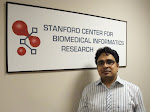https://sites.google.com/site/ahsanmorshed/home
Monday, December 10, 2012
Wednesday, February 8, 2012
E-Advocacy of Linked Open Data
Even though the practice of metadata were changed from catalogue cards to machine-readable formats, for a long time metadata information is stored in repositories as electronic records. During the recent year, the World Wide Web is moving from the web of documents to the web of data. The metadata information is moving from merely machine-readable towards machine-processable, where it is essential to break the record and repository silos and make data (especially metadata) into machine understandable pieces. We present information about the data using the RDF (Resource Description Framework) which provides a data model for presenting metadata as machine-understandable and –processable triple statements (i.e., subject, object, predicate). For example, Adam (subject) is from (predicate) Peru(object). The subject of a triple is the URI (Uniform Resource Identifier) identifying the described resource, a predicate is the existing relationship between subject and object, and an object is a literal value or the URI of resources that is somehow related to the subject. In the above example, “Adam” is a person and “Peru” is a country. Although they represent totally different metadata, they are linked through the predicate (properties) and made it possible to gain the data and information from Adam to Peru such as the population, environment, currency, culture etc. of Peru. Furthermore, the information will be connected into the Linked Open Data (LOD) cloud where anybody can join, put their data and access the others information. This LOD concept are mostly known to EUROPE and North America because of their advantage of research and technology. However, a very few part of Asia, Africa and South America have been got this blessing news of new information technology but 95 % people do not know about the concept of LOD.
Most of the people do not want to break their silos. Even though one institute publish their data into the web by connecting other data sources, but other institutes do not interested to join the LOD due their legacy system. For example, AGROVOC has been published as LOD since June 2011 with different data sources (i.e., EUROVOC,GEMET, DBpedia, LCSH, STW, TheSoz, Geopolitical Ontology, and Rameu ) ; but EUROVOC does not include the AGROVOC links into their LOD interface. The users of EUROVOC do not get any advantage from the AGROVOC links. It means that we need to publish the necessary knowledge in order to attract the people.
The light of the above discussion, we can promote the best practices of LOD by E-Advocacy of LOD Platform where people can change their views and get all their answers. Furthermore, by using this model, we can make a bridge between all countries.
